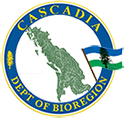What is bioregional mapping? What is a bioregion? How do we map the layers and connections important to each place, stories left off traditional maps, and develop bioregional frameworks needed to steward our homes? Welcome to “Exploring Bioregional Mapping,” a four-week journey into bioregionalism and mapping. In this interactive course, we will delve into the principles, techniques, and applications of bioregional mapping, focusing on helping each of us map our home places – unique regions known as bioregions. Course Description: In this course, we’ll lay the foundation by exploring the core principles of bioregionalism. We’ll discuss the importance of ecological boundaries, interconnectedness, and local self-sufficiency and how these concepts shape our understanding of bioregions. By the end of the course, you’ll have a solid grasp of the fundamentals of bioregionalism and its relevance to mapping. We’ll dive into the principles and techniques of bioregional mapping. You’ll learn to map a bioregion, from gathering data to visualizing ecological boundaries. We’ll explore various tools and methods used in bioregional mapping and discuss the importance of incorporating local knowledge and community perspectives into the mapping process. How do you map your bioregion and identify local ecosystems, resources, and community assets? You’ll apply the knowledge and skills gained throughout the course through group discussions and collaborative exercises to create your own bioregional map. By the end of the course, you’ll have a deeper understanding of your bioregion and how you can contribute to its conservation and well-being. Each week, we will focus on a different topic, with a brief presentation, time for discussion, and an activity to help people map their home places and bioregions. After the four-week course, people will be invited to undertake a process for mapping their home places and share their initial research and findings with the group, helping us create an atlas of bioregions and bioregional frameworks that people find important.







